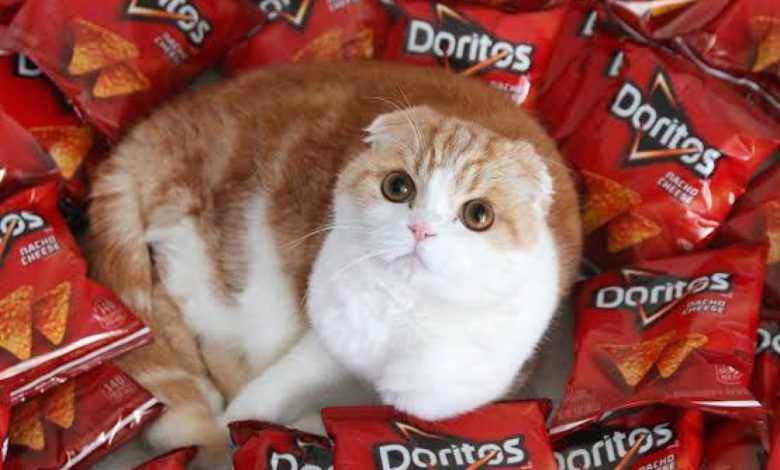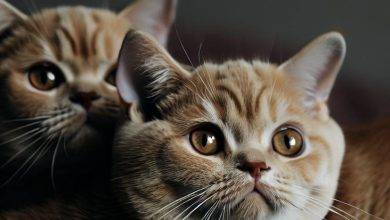Can Cats Eat Doritos? Here is What you Need to know

As a responsible pet owner, it’s natural to be cautious about what you feed your furry feline friend. You might be tempted to share your favorite snack with your cat, but it’s essential to know whether it’s safe or not. SullPet
Doritos are a popular snack among humans, and you might have noticed your cat staring at you with big, pleading eyes while you munch on them. But can cats eat Doritos? In this article, we’ll dive deeper into the pros and cons of feeding your cat this popular snack and what alternative treats you can offer them.
What Are Doritos Made Of?
Doritos are crispy, cheesy, and flavorful chips that are made from corn, vegetable oil, salt, cheddar cheese, and various seasonings. While some of these ingredients are safe for cats in small amounts, others could potentially cause harm.
For example, corn is a staple ingredient in many cat foods and is generally safe for cats to consume. However, cats are obligate Meat-eaters, meaning they require a high-protein diet to maintain their health. Corn does not provide much nutritional value to cats, and excessive consumption could lead to weight gain and other health issues.
Vegetable oil is another ingredient in Doritos that is not suitable for cats. While cats need a certain amount of fat in their diet, they require animal-based fats, which are essential for their health. Vegetable oil contains high levels of polyunsaturated fatty acids, which are not suitable for cats and can lead to inflammation and other health issues.
Cheddar cheese is also another ingredient in Doritos that cats might find appealing, but it’s not the best option for their diet. Cheese is high in fat and lactose, which can be difficult for cats to digest, leading to digestive problems such as diarrhea and vomiting.
Finally, Doritos contain high levels of salt, which is not suitable for cats. Cats require a balanced diet with the right amount of sodium to maintain their health. Excessive salt intake can lead to dehydration, kidney problems, and other health issues.
Also Read: Can Cats Drink Chocolate Milk? Understanding the Risks
Are Doritos Safe for Cats to Eat?
As much as it might pain us to say it, Doritos are not a good snack option for our feline friends. While they may be tempting to share, many human foods, including Doritos, are high in salt, artificial flavors, and other ingredients that can be harmful to cats.
Regularly snacking on human food can also disrupt a cat’s balanced diet, which could lead to long-term health problems.
It’s essential to remember that cats have specific dietary requirements that differ from humans. They need a diet that is high in protein, with moderate amounts of fat and minimal carbohydrates. Excessive consumption of human food can lead to health problems such as obesity, dental issues, digestive problems, and even diabetes.
Also Read: Can Cats Eat Oysters? Nutritional Benefits and Risks
The Dangers of Feeding Your Cat Human Snacks
Feeding your cat human snacks on a regular basis can lead to a variety of health problems. One of the most significant risks is obesity. Many human snacks, including Doritos, are high in calories, which can quickly add up and lead to weight gain in cats.
Risk of feeding your cat Doritos
Obesity: Obesity in cats can lead to a variety of health problems, including diabetes, liver disease, and joint problems. It can also shorten their lifespan and affect their quality of life.obesity, regularly feeding your cat human
Doritos or other snacks can also cause dental problems. Many human snacks, including Doritos, are high in carbohydrates, which can lead to the formation of plaque and tartar on your cat’s teeth. This buildup can lead to gum disease, tooth decay, and eventually tooth loss. These dental issues can be painful for your cat and can also lead to other health problems if left untreated.
Digestive problems are another potential risk of feeding your cat human snacks like Doritos. Cats have very sensitive digestive systems that are designed to handle a specific type of diet.
When they are fed foods that are high in salt, fat, and other unhealthy ingredients, it can cause digestive upset, including diarrhea, vomiting, and constipation. In severe cases, it can even lead to pancreatitis, a potentially life-threatening condition that occurs when the pancreas becomes inflamed.
Finally, diabetes is another potential health problem that can be caused by a diet high in human snacks. Many human snacks, including Doritos, are high in carbohydrates, which can cause spikes in your cat’s blood sugar levels.
Over time, this can lead to insulin resistance and eventually diabetes, a condition that requires lifelong management and can have serious health consequences.
Here are some other options for cat-friendly snacks:
- Fresh fruits and vegetables: Some cats enjoy nibbling on fresh produce like blueberries, green beans, or sliced cucumber. Just make sure to research which fruits and vegetables are safe for cats and introduce them gradually to avoid digestive upset.
- Commercial cat treats: There are plenty of cat treats available on the market that are formulated to meet your pet’s nutritional needs. Look for treats made with high-quality proteins like chicken, turkey, or fish and avoid products with fillers or artificial flavors.
- Homemade cat treats: If you’re feeling adventurous, you can make your own cat treats at home using ingredients like tuna, chicken, or even baby food. Just be sure to follow a recipe specifically designed for cats and avoid ingredients that are toxic or unhealthy.
- Cat grass: Many cats enjoy nibbling on fresh grass, which can help aid digestion and provide essential nutrients. You can purchase cat grass kits online or at pet stores, or even grow your own at home.
- Freeze-dried meat: Freeze-dried meat treats are a popular choice for many cat owners, as they are high in protein and easy to store. Look for products made with high-quality meat and no added fillers or preservatives.
So It’s important to remember that even healthy treats should be given in moderation, as too many can disrupt your cat’s diet and lead to health problems. Consult with your veterinarian to determine how many treats are appropriate for your pet based on their age, weight, and overall health.
NOTE THIS
In addition to choosing healthy treats, it’s important to provide your cat with a well-balanced diet that meets their nutritional needs. Most cats do well on a diet of high-quality commercial cat food that is formulated to provide all the essential nutrients they need. Be sure to read labels carefully and avoid products with fillers, artificial flavors, or excessive amounts of salt or sugar.
Can you make your cat food at home
Making your pet food at home is a smart move, but if not done properly, it could end up being the strongest move you ever make (and not in a good way). Without proper guidance and understanding of your pet’s nutritional needs, homemade diets can quickly become unbalanced or nutritionally deficient, leading to health problems down the line.
That’s why it’s essential to seek the advice of a veterinary nutritionist before embarking on a homemade diet for your pet. With their help, you can create a healthy and well-balanced diet that will keep your pet happy and healthy for years to come.
In conclusion
while it may be tempting to share your snack with your cat, it’s important to remember that many human foods are not safe or healthy for cats. Instead, choose cat-friendly snacks that are high in protein and nutritionally balanced, and provide your cat with a well-balanced diet that meets their nutritional needs. By taking a mindful and responsible approach to your cat’s diet, you can help ensure that they live a long, healthy, and happy life.



